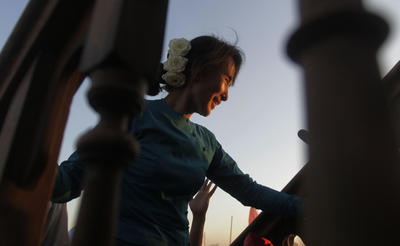Her first was to Europe in June where she finally received her 1991 Nobel Peace Prize. Her second was to Washington in September where she received a Congressional Gold Medal, the highest honour the US Congress can bestow. Now she’s back in Myanmar where, to use her own words, ‘so many hills remain to be climbed, chasms to be bridged, obstacles to be breached’.
Aung San Suu Kyi’s stature is as unassailable in Myanmar as it is abroad, but she still confronts many political challenges. Over the next two and a half years, she must work with President Thein Sein to cement democracy in Myanmar, to consolidate her own political standing and to lead her party, the National League for Democracy (NLD), to victory in the 2015 elections.
But she cannot assume that her overwhelming popularity in Myanmar today will remain intact over the next few years. The president, known for his honesty and low-key style, is emerging as a formidable political force in his own right, leaving Aung San Suu Kyi’s political future far from assured. If Aung San Suu Kyi seeks the presidency in 2015 — and she has been candid about her presidential aspirations — she has her work cut out for her.
This means that Aung San Suu Kyi cannot rest on her laurels and must keep leading the drive for change in Myanmar. One of her immediate priorities needs to be transforming the NLD from a party of opposition to a credible, national force with proven credentials for wielding power. This can be done in three ways.
First, she will need to expand the party’s reach to compete effectively with Myanmar’s ruling party, the Union Solidarity and Development Party. In the 2015 elections, the NLD will need to contest all 498 parliamentary seats nationwide. This requires building the party’s infrastructure and its political base across the country without diluting its democratic ideals and core principles — achieving this in only two years is impossible without a combination of strong management and political leadership.
Second, she needs to make the NLD’s membership and leadership more reflective of the broad electorate. The plan is to more than double the party’s membership from 400,000 to over a million, with an emphasis on recruiting more youths and women.
And third, the party needs to become an institution that is bigger than just its leader. Aung San Suu Kyi will be 70 in 2015 and neither her health nor her safety should be taken for granted. The NLD has much to gain from grooming its next generation of leaders and building their political visibility.
But building the NLD’s leadership and membership is only part of the challenge. Aung San Suu Kyi and her party need to develop clear positions on a range of urgent policy issues. The NLD must determine how to implement Myanmar’s economic liberalisation, transform ceasefire agreements with ethnic minorities into a long-term political framework, identify a permanent solution to the deep-rooted tensions between the Rohingyas and ethnic Buddhists in Rakhine State, and lay the institutional foundations for democracy and good governance. The party also needs to become more open to new ideas from outside the party, especially from Myanmar’s skilled diaspora.
Additionally, Aung San Suu Kyi and her inner circle must sufficiently differentiate their policies from those of the ruling party. This will not be easy. President Thein Sein has shown considerable initiative, surprising everyone with his reformist instincts and gaining greater stature within Myanmar and abroad.
If Thein Sein decides not to run as president in 2015, his impressive legacy could nevertheless be bequeathed to many possible successors, particularly Thura Shwe Mann, the speaker of the lower house of parliament and the party’s spearhead for further reform. Shwe Mann is part of the trio at the helm of the country’s affairs — together with the president and Aung San Suu Kyi — and a key reformist force within the ruling party.
Unlike the president and the ruling party, Aung San Suu Kyi and the NLD have to work hard to gain the military’s support and neutralise any possible backlash against the country’s nascent political and economic reforms. Myanmar’s military may have handed over the reins of government to a civilian administration, but it still dominates the country and sees itself as indispensable for the country’s unity, stability and independence.
Aung San Suu Kyi has been careful thus far to maintain good relations, reminding the military that her father was the founder of the Burmese army. She will, however, also need to reassure military leaders that an NLD victory will not trigger commissions of inquiry into human rights violations or resource cutbacks that may undermine the military’s influence.
Finally, Aung San Suu Kyi will need a change to the constitution in order to run for president. The 2008 constitution forbids anyone from becoming president who has children that are citizens of a foreign country (Aung San Suu Kyi’s children are citizens of the United Kingdom). She has acknowledged that the constitution will need to be amended not just for her, but ‘for the country’. Orchestrating this will be a real challenge and she will need to garner broad support from all political parties and the military.
Aung San Suu Kyi has large hills to climb, chasms to bridge and obstacles to breach indeed. Her ability to tackle these priorities will impact the 2015 elections and beyond.
Vikram Nehru is Senior Associate in the Asia Program and Bakrie Chair in Southeast Asian Studies at the Carnegie Endowment for International Peace.
Van Tran is a Carnegie Junior Fellow at the Carnegie Endowment for International Peace.
An earlier version of this article was first published here by the Carnegie Endowment for International Peace.

